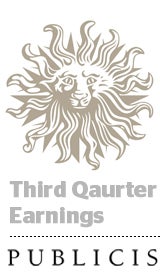 Publicis Groupe reported a meager 1% organic growth rate for 2014’s Q3 on Thursday, with the displeased CEO Maurice Lévy blaming key account losses at Razorfish and lingering “distraction” on the failed Omnicom fusion. Publicis’ revenue in Q3 grew 4% YoY to reach $2.21 billion.
Publicis Groupe reported a meager 1% organic growth rate for 2014’s Q3 on Thursday, with the displeased CEO Maurice Lévy blaming key account losses at Razorfish and lingering “distraction” on the failed Omnicom fusion. Publicis’ revenue in Q3 grew 4% YoY to reach $2.21 billion.
“We have been too much focused on [the merger] and not enough on short term issues and growth,” Lévy told investors during the call, “and we are paying the price for that.” Despite Lévy’s assertions, Omnicom Group reported organic growth of 6% in its Q3 and made little mention of the fiasco with Publicis.
Certainly key account losses at digital agency Razorfish – as well as clients like Blackberry trimming back their advertising budgets – had a more tangible negative effect on Publicis.
Consequently, Publicis restructured the agency as Razorfish Global to include assets from Nurun and Rosetta.
In a statement, Lévy said the company is nearing the end of a negative growth cycle and expressed confidence in Publicis’ vitality. Strong growth in digital is one indicator of an impending uptick, said Lévy, and digital now accounts for 42% of Publicis’ revenue and is growing by more than 9%. He anticipated new client wins, such as Samsung, will also help bring about a better financial forecast by year’s end, he added.
But analysts aren’t so sure. Salmon added that on the whole, “Organic revenue growth slowed again and is not expected to pick up in the most seasonably important (and often least predictable) fourth quarter. This further puts this year’s margins at risk, and today’s downward move in the stock properly accounts for that. Investor patience has been tested.”
Publicis’ quarterly didn’t focus heavily on programmatic, despite Lévy claiming its VivaKi unit “created the first platform with AOD.” He called programmatic a “complex issue” due to the abundance of tools on the market, not all of which are transparent – possibly a dig at WPP.












